Shareholders of AMIC Ukraine: “Now it’s the time to take care of the community and its needs. Business comes later”
Günter Maier and Andreas Sernetz discuss network development and restoration of lost stations, social responsibility and investments in promising areas, as well as expectations for the current year
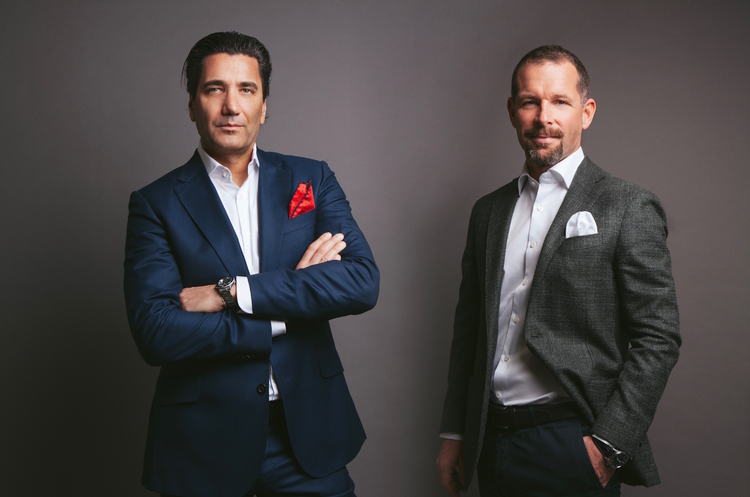
AMIC ENERGY operates in five markets (Austria, Latvia, Lithuania, Poland, and Ukraine) and has about 470 mobile and retail service stations with a few dozen charging stations for electric vehicles. However, this statistic was affected by the war – 36 gas stations were damaged and some facilities were almost destroyed.
Nevertheless, according to the analytics of the A-95 Consulting Group, AMIC Ukraine is among the top three fuel market leaders in the amount of taxes paid. The chain has turned its stations into “Points of Invincibility” and now is introducing an updated design of fuel stations in Ukraine with plans to increase the number of convenience goods in stores, while improving the menu at stations.
What to expect from the AMIC ENERGY network, what Europeans can learn from Ukrainians, and what the fuel market will look like in 2024, we discussed with Günter Maier and Andreas Sernetz, two of the four shareholders of the Austrian company AMIC ENERGY Holding GmbH..
– When comparing Ukrainian and European gas stations in terms of service, offer, convenience and digitalization, can we say that some are better and some are worse?
Günter Maier: Thank you for the question, it is interesting to think about the answer. In particular, AMIC gas stations in Ukraine can be compared to European ones. Also with the ones in Austria and with our stations in Poland and Lithuania.
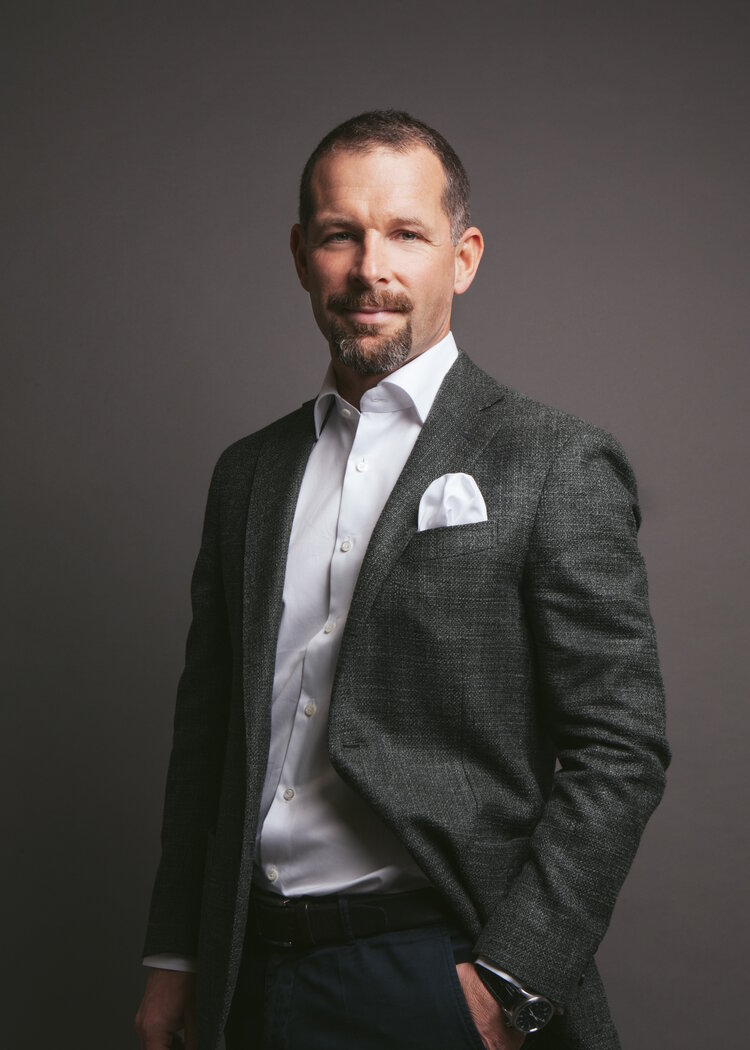
Günter Maier
The service and the range of convenience goods offered at our stores at the gas stations are the same. For many years, from 2015 to the present day, we have been actively developing our network of stations – including those in Ukraine. We have purposefully invested in the quality of services at our stations and in expanding the range of our stores.
Today, AMIC stores in Poland and Ukraine offer around 2,000 items, and our Ukrainian colleagues are enthusiastic about designing and implementing additional services at the stations – of course, based on a customer-oriented approach.
In terms of digitalization, Ukraine is already at the forefront of development. When we visited Ukraine before and during the war, we saw applications and solutions created here and exported to many European countries. In my personal opinion, this shows that Ukrainians have chosen the right path towards technology development. In addition to significant production positions (for example, in the agricultural sector), you have a good technological and engineering heritage that can be developed into a competitive advantage.
That's why we have also created a mobile app that covers all the services and products of our gas stations.
Andreas Sernetz: I share Günter's opinion that Ukraine is at the forefront of technological development.
That's why we launched AMIC ENERGY loyalty program here, including AMIC Pay service, which allows you to pay for fuel by scanning a QR code on a gas dispenser with any payment method: from a bank card to an NFC chip in your smartphone. This was one of our first initiatives in Ukraine and, frankly, it is still not fully implemented in Poland and Austria.
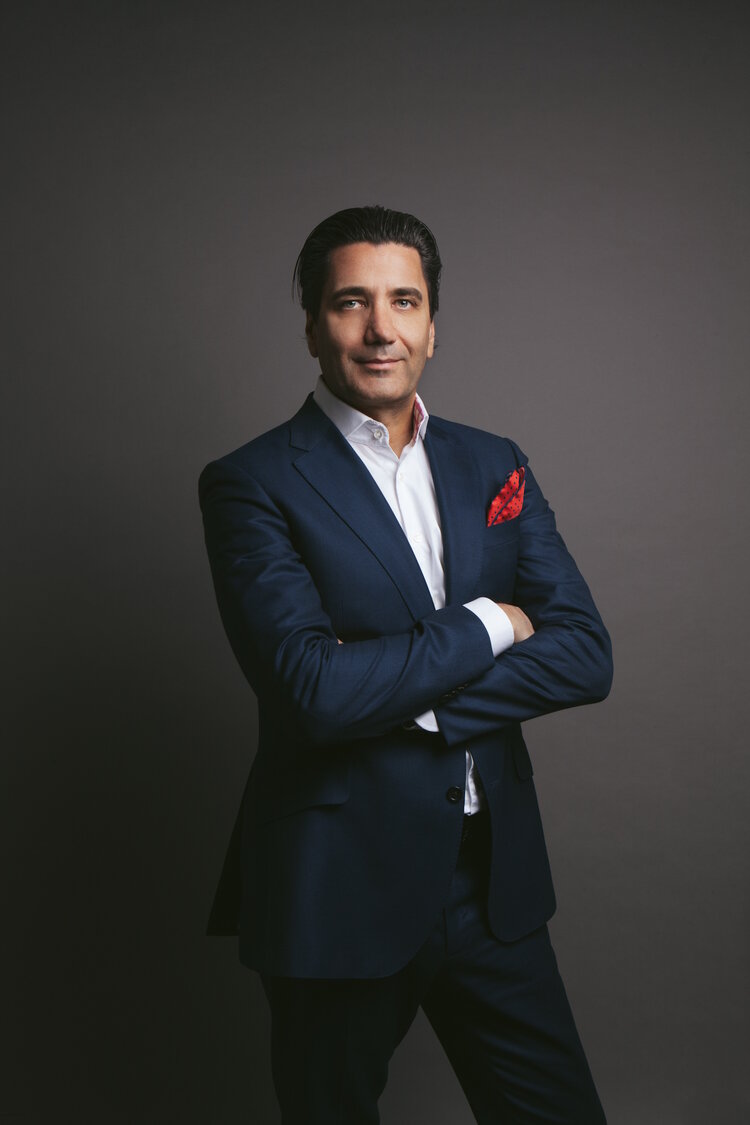
Andreas Sernetz
Such a pace of work and appreciation of technology is a consequence of the ambitions and rationality Ukrainians possess. They quickly adapt to difficult times.
Ukrainians, generally speaking, have creativity, passion, and drive much higher than anyone else in Europe. What people do here is amazing. Especially given the difficult times. I think this will become a real competitive advantage for the country after the war.
– What is the business structure of AMIC ENERGY? What is the percentage of non-core sales: shop, restaurant, etc?
GM: We operate several types of business. The traditional one is fuel sales. In Ukraine, it now has a large share. The second is stores at gas stations, and the third is food, coffee, services and recreation.
A contemporary fuel station – we call them 'service stations' or 'mobile stations' – relies on amenities available. Which belong to the second and third types of business. This is an objective reality in the world.
When we acquired AMIC ENERGY, we had the opportunity to bring this trend to Ukraine, as it had not been fully implemented here yet by that time. We knew that compared to a traditional fuel station, the one that provides additional services has an advantage.
If we talk about the total profit, the share of convenience goods or services reaches 40-45%. And it's not even just about net financial profit from sales. It's about the recognition that these sales bring to the entire company.
Visitors should feel comfortable at gas station. This was especially true last winter when there was no electricity. We had the opportunity to continue working with a generator at each station. However, we were pleased to find out that our stations in Ukraine are no longer just "fast food and gas stations”, but are "Points of Invincibility" where you can charge your phone and relax, with electricity and warmth.
A lot depends on the market, really. For example, in Poland, most stores are always open because they are family-owned and run by a family. This is not the case in Austria and Ukraine. Therefore, at night or on weekends, our stores are often the only opportunity to buy everyday goods.
In times of war in Ukraine, we have really become the Points of Invincibility.
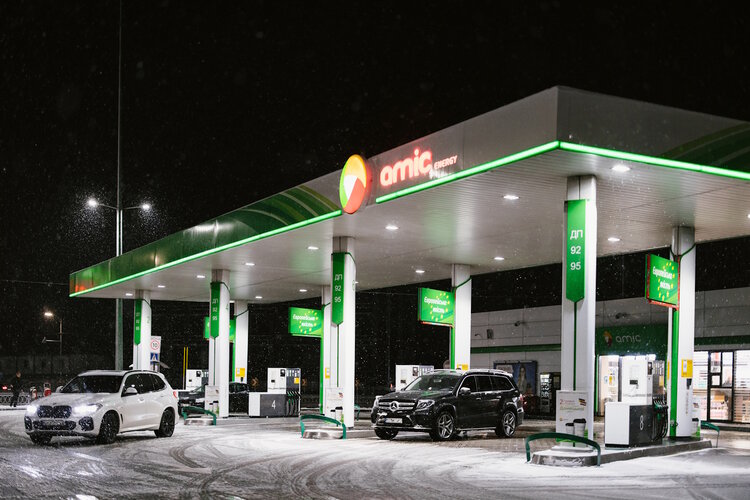
AS: After Ukraine's victory, we will bring much more new concepts here to implement. At least, the next "big topic" will be charging stations for electric vehicles, which would be a game changer.
Charging an electric vehicle takes a lot of time. And this time has to be spent somewhere. To this point, we have to make an offer to car owners.
The same applies to the store. We observe in Poland that the cooked offers expanded our customer base. That's why we brought Sbarro pizza there – it's an American franchise of Italian cuisine. It's a delicious pizza that is made entirely at the station, without deep freezing and is very conveniently packaged to eat in the car.
This offer, among other things, has become a very popular product for night delivery. And already about a third of our revenue comes from our pizza business. Not from users who stop in for fuel! From pizza lovers and Uber Eats deliveries! We plan to do the same in Ukraine, offering pizza on the station menu.
For us, these services and ideas are important because we are not fuel producers. With that in view, extending our service offers brings in more profit.
– The ‘Points of Invincibility’ that AMIC stations have turned into are not a profitable addition for the company. This is not business at all, but pure social responsibility for business. What is your vision of the company's corporate social responsibility, and what is being done in this direction?
GM: During difficult times, it is very important to be close to people, where you operate. People may not be able to thank you right away, but they would not forget if you have left the country to spend some time in comfort.
We don't expect to make a profit from our initiatives to support Ukrainians who were warming up, eating and checking messages from their loved ones at our stations. We believe that this is how people should behave.
Business should be about meeting customer needs. And if they have these urgent needs, you have to meet them. I believe that a person who comes to stay warm and buy what they require will either become our client now or in the near future.
At the very beginning of the war, we set priorities within the company for our headquarters and local employees: both in Kyiv and in other regions, safety is the number one priority, and business – is number two.
During the full-scale invasion, we made contributions of more than three million euros. They were received not only by the armed forces, but also by charitable foundations that deal with medicine. We also believe that flexibility is one of the key indicators. For example, after the destruction of the Kakhovka hydroelectric power plant, we did not stand aside and helped the Kherson region to overcome the consequences of this disaster.
And despite the war, we want to add a bit of "Austrian spirit" to our projects to help Ukraine. Thanks to the cooperation with the Embassy of the Republic of Austria in Ukraine, with the support of the Ambassador, Dr. Arad Benkö, we have once again become the general partner of the Austrian Film Week, which took place in several cities of Ukraine.
We believe that supporting art has a significant importance during such difficult times as these.
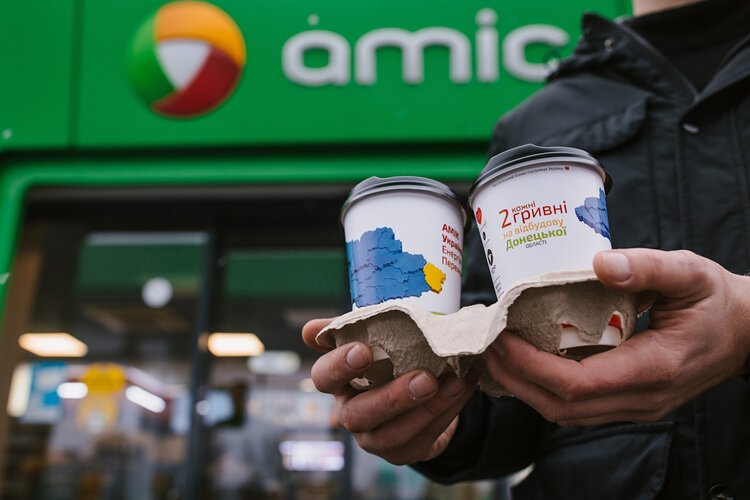
AS: We have many initiatives aimed at supporting Ukrainians and the Armed Forces of Ukraine. One of the most successful ones is the Invincible Coffee campaign, under which every UAH 2 from the purchase of each cup of hot beverage goes towards restoring 4 regions of Ukraine.
I would like to emphasize that this program was invented and developed by our CFO Tetiana Telezhynska – she invented the cups, she created the whole idea and concept. This is a perfect example of how full of creativity and energy Ukrainians are today.
Our other major project is MAVIC from AMIC. As part of it, we transfer UAH 5 from each fuel receipt to purchase drones. We do it together with Dignitas Fund. This is a very popular and successful project. Right now, we have another 75 drones sent to the Armed Forces.
We are really proud of these projects. However, there are many other initiatives that we support. 103 of our employees are currently deployed in the Armed Forces. They receive a monthly surcharge from the company and have guarantees: if they are injured, the company will pay for their treatment.
In addition, we have provided more than 400,000 liters of fuel to the Security and Defense Forces of Ukraine and volunteers.
We also support the battalions in which our employees serve with winter gear, fuel cards, etc. These are our small initiatives for the community.
Like Günter, I don't think it's the time to think exclusively in terms of business. It's time to take care of society and its needs. This is more important than business. Business comes later.
– You pay a lot of attention to the Ukrainian part of the business, which is understandable given your knowledge of the local situation. What can Ukrainians learn from Europeans and what can Europeans learn from Ukrainians?
GM: Regarding the understanding of the situation in Ukraine, I can say that we aim to expand the offer and quality of services at the stations. On the one hand, we presented an updated design: brighter, friendlier, more open, modern. Three stations in Ukraine have already been renovated, and three will be completed soon.
In general, we are now restoring what we have lost. We are rebuilding the destroyed stations and fuel terminals and hope to make our network better than it was. We are waiting to win so that we can move on to a growth strategy by acquiring other assets and developing the existing network.
AS: I would like to say what Europeans can learn from Ukrainians. We are amazed and admire the motivation, ambition and hard work of Ukrainians. Especially now.
If you look at the countries of the European Union, there is a lack of motivation, a lot of discussions about work-life balance. In Ukraine, everything is different. The attitude towards people is different. People themselves are resourceful, ambitious, and capable of doing things that no one would even expect them to do.
If it stays the same, Ukraine will have a wonderful and prosperous future. And we, in turn, are happy to be a part of this history.
GM: I'll add a bit of provocation: in this "spoiled" Western Europe, there is a lot of talk about life-work balance. Everybody talks about work-life balance.
Ukrainians are focused on how to stay alive. They have no time to talk about work-life balance, they need to survive. But on the other hand, they are already restoring their country, making it suitable for living.
As for technology, automation, and digitalization, Ukraine just needs to keep moving forward. We have a lot of experience and professional education, so Ukraine will soon catch up with other countries.
– You mentioned the renovated stations. As far as we know, the first one was opened in the Rivne region. What is its success, and will this experience be scaled up to the whole of Ukraine?
GM: Yes, the innovation was successful, indeed. We have an updated menu, open space, bright modern colors in the interior, which consists of areas suitable for both work and rest. And, of course, we will continue these processes.
We need to understand that the prospects and speed of innovation are severely limited by the war and its course. We invest about EUR 5.6 million annually in our network, which is lower than we would like. The focus now is mostly on repairing and rebuilding stations that get under attack.
We also have destroyed stations. And if we evaluate the need for reconstruction and the lack of a guarantee of station safety, then renovation does not seem to be such an urgent project. Therefore, we are now focused on more urgent, necessary and important things.
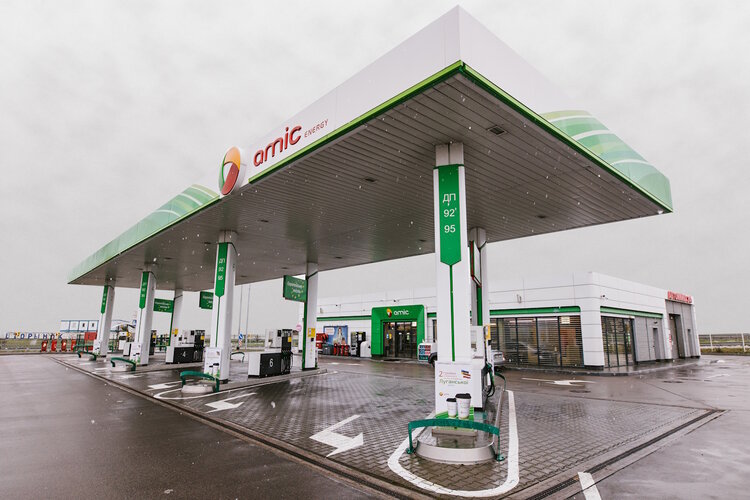
AS: Currently, our losses amount to 36 damaged (and some almost destroyed) facilities, 17 of which have already resumed their work. We are trying to restore the operation of each station as soon as possible. If the station is far from the front line, we try to renovate it and start working.
This major renovation, in our opinion, was successful. When we were developing the updated concept, we were very focused on the idea of mobility. We combined fuel and trade and focused marketing activities around this combination. And the number of customers at the updated station has increased by 33%. This is an extraordinary success! This is a proof that the concept works!
– Let's move on from individual stations to a nationwide chain. What will the fuel business look like in 2024? How will the corporate culture develop in a company whose employees are part of the Armed Forces of Ukraine, internally displaced persons, and those who have lost loved ones?
GM: We will continue to focus on putting people and the team first. We believe that we must be as strong as our employees and service providers at every Ukrainian station.
Therefore, we will invest in network upgrades to make it easier for our employees to work and serve our customers. In addition, we will continue to do all kinds of charity projects and talk about them. We believe that a good reputation for the company will contribute to greater employee engagement.
I am confident in the bright future of Ukraine, which survived through the darkest times. With the help of our foreign partners, Ukraine will win, and afterward, we will have an extremely dynamic market here.
This will contribute to the growth of both the AMIC ENERGY chain and each individual employee. After all, those who have been with us and stayed with us will be with us in the future – and will benefit from a growing and active market – by becoming successful with the company and receiving a share of its success.
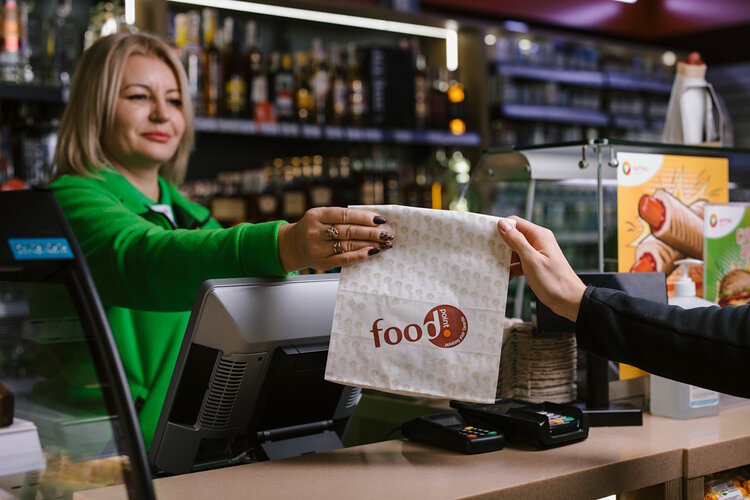
AS: I would like to mention another important area that we will be developing at AMIC. This is the reintegration of veterans. The first employees are already starting to return and we want to develop a program for their adaptation after the war to help them cope with what they have been through. Of course, this will be accompanied by comprehensive support so that they have the opportunity and time to reintegrate into society and return to the workplace.
I think this area will be important for almost all Ukrainian businesses – taking care of veterans returning from the war.
– What financial prospects and indicators do you expect to see in 2024? How do you think the fuel business will develop in Ukraine?
GM: I don't think it will be a surprise or a secret that the company's sales have fallen by about 40% compared to the pre-war period, similar to the overall economic situation in Ukraine. However, compared to 2022, the progress in 2023 was 20%. This is an understandable trend, both for us and for the country, because in 2023, everyone has already gotten used to many things and started to improve their lives.
It is essential to understand that Ukrainians have a demand for rational and economical consumption. The overall economic situation is quite fragile, so people are looking for good deals – and they choose ours. Otherwise, businesses would not be able to stay afloat.
In the future, we see a moderate upward trend. If nothing significant changes, a cautiously optimistic scenario is realistic. The company earns enough to pay taxes – to finance the Ukrainian army, and of course, salaries, to run charitable projects of various kinds, to spend wisely and invest in the Ukrainian network. We currently feel like a healthy company that fulfils its responsibilities to the full without having debts.
AS: We believe that in 2024, moderate year-on-year growth will also be around 20%. In the first quarter, we saw confirmation of this forecast. With that in view, we will definitely continue to invest in Ukraine.
The material in the Point of View section reflects the author's personal opinion and may not align with the opinion of the Mind team. It does not pretend to be unbiased and comprehensive in its coverage of the subject in question. As a rule, the author is the one who initiates the writing.
The editorial team does not bear responsibility for the accuracy and interpretation of the information presented and serves solely as a medium. Materials in the Point of View section can be published both commercially and free of charge.
The main requirement is the social importance of the subject and the author's open public position.


